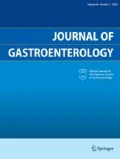Abstract
Background
Hepatocellular carcinoma (HCC) is a common hepatic malignancy worldwide. Its nature of rapid growth results in a grave prognosis. Hepatocyte growth factor (HGF) is a mitogen for hepatocytes, responsible for their proliferation. The aim of the present study was to investigate the prognostic roles of serum HGF in untreated HCC patients.
Methods
Fifty-five patients with inoperable HCC were studied. The diagnosis of HCC was based on either liver histopathology or imaging evidence of a liver mass, together with elevated serum alpha-fetoprotein. Serum HGF levels of the patients, at the time of diagnosis, were compared to those of 28 healthy controls. All patients received only palliative treatments and were followed up until they died. Comparison of survival curves between patients with a serum HGF level of 1.0 ng/ml or more and those with lower serum HGF was performed, using the log-rank test. Data values are expressed as means and SD.
Results
Fifty-one men and four women with inoperable HCC were recruited. The mean age was 54.15 ± 15.34 years. The serum HGF levels in the inoperable HCC patients were significantly higher than those in the controls (0.58 ± 0.43 vs 0.14 ± 0.04 ng/ml; P < 0.001). The patients’ mean survival time was 5.28 ± 6.73 months (range, 0.1–33 months). Serum HGF levels exhibited a negative correlation with the survival time (P = 0.032). In addition, HCC patients with serum HGF levels of 1.0 ng/ml or more had a shorter survival time than the other HCC patients (P = 0.0025).
Conclusions
Patients with inoperable HCC had higher levels of serum HGF than the healthy controls, and serum HGF was negatively correlated with the survival time. Serum HGF levels of 1.0 ng/ml or more in HCC patients are suggestive of a grave prognosis, indicating that HGF plays important and active roles in the disease progression. The detailed mechanisms need to be further investigated.
Similar content being viewed by others
Author information
Authors and Affiliations
Rights and permissions
About this article
Cite this article
Vejchapipat, P., Tangkijvanich, P., Theamboonlers, A. et al. Association between serum hepatocyte growth factor and survival in untreated hepatocellular carcinoma. J Gastroenterol 39, 1182–1188 (2004). https://doi.org/10.1007/s00535-004-1469-8
Received:
Accepted:
Issue Date:
DOI: https://doi.org/10.1007/s00535-004-1469-8




